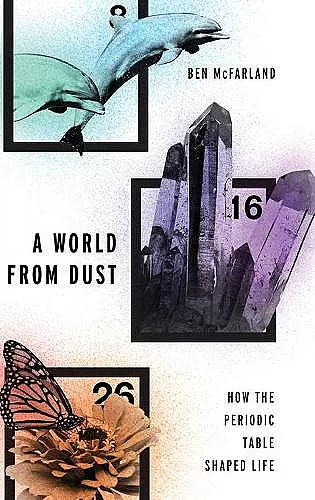A World From Dust
How the Periodic Table Shaped Life
Format:Hardback
Publisher:Oxford University Press Inc
Published:14th Jul '16
Currently unavailable, and unfortunately no date known when it will be back

A World From Dust describes how a set of chemical rules combined with the principles of evolution in order to create an environment in which life as we know it could unfold. Beginning with simple mathematics, these predictable rules led to the advent of the planet itself, as well as cells, organs and organelles, ecosystems, and increasingly complex life forms. McFarland provides an accessible discussion of a geological history as well, describing how the inorganic matter on Earth underwent chemical reactions with air and water, allowing for life to emerge from the world's first rocks. He traces the history of life all the way to modern neuroscience, and shows how the bioelectric signals that make up the human brain were formed. Most popular science books on the topic present either the physics of how the universe formed, or the biology of how complex life came about; this book's approach would be novel in that it condenses in an engaging way the chemistry that links the two fields. This book is an accessible and multidisciplinary look at how life on our planet came to be, and how it continues to develop and change even today.
The narrative should appeal to anyone interested in viewing chemistry and biology from a general, perhaps poetic, perspective. Although intended for a general audience, some background knowledge of chemistry, biology, and evolution of the world is probably needed to fully appreciate the story. The style is informal, and the presentation includes many intriguing real-world contexts and examples, and numerous thought-provoking metaphors and analogies. * David M. Hanson, Quarterly Review of Biology *
The story told in A World from Dust is a fascinating one and McFarland deserves credit for uniting several scientific fields in an imaginative way. * Jamie Durrani, Chemistry World *
The diversity and number of different subjects are such that it would be almost impossible to provide a summary ... a gold mine for those who, almost without a prerequisite for maths, aim to address the origin of life and the chemical reasons for evolution. Teachers in chemistry or geochemistry searching for original examples to illustrate their lessons will find a lot in this book * Marc Hebrant, Structural Chemistry *
To quote, this book is "natural history told by a chemist" -- and this chemist and author does a superb job. ... As this work is written for non-scientists at an elementary level, it is recommended for all audiences -- general and scientific. * R. E. Buntrock, CHOICE *
The author makes a decent argument for the chemical predictability of evolution as a bridge between biology and physics. The book's chronological structure and colloquial writing style make the book easy to read. The contents manage to walk the edge between technical and popular. * Rosie Cawkwell, Rosie Writes *
McFarland's unique way of looking at things gives new insights to the reader on the topic established in the subtitle: how the periodic table shaped life. * Brian Clegg, Popular Science *
Like all good works of science for the general public, McFarland's is full of fascinating examples, a dash of humor, and just plain cool facts. * Publishers Weekly *
ISBN: 9780190275013
Dimensions: 165mm x 239mm x 25mm
Weight: 635g
352 pages